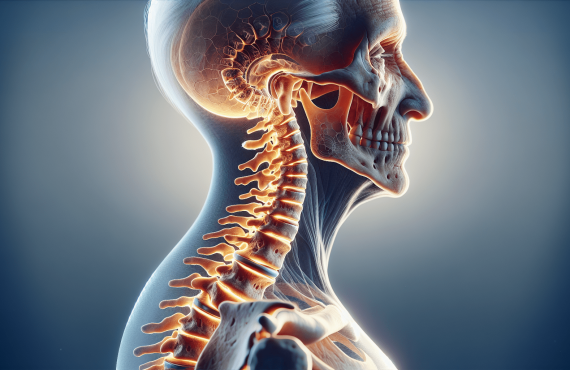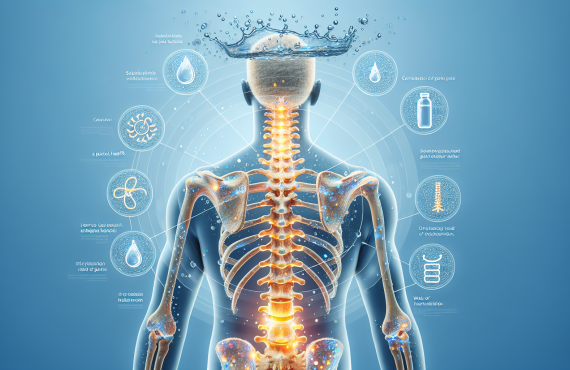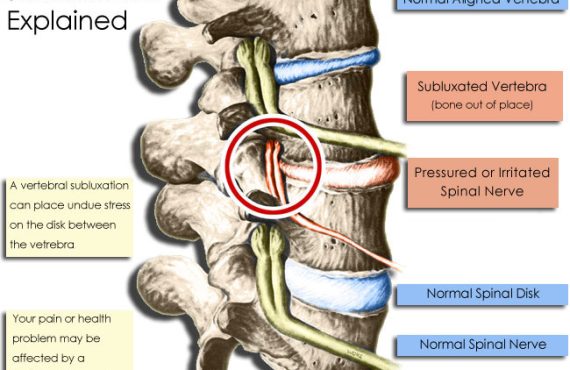Did you know that there is a direct correlation between core strength and spinal health? Maintaining a strong core is not just about having a flat stomach or six-pack abs; it plays a crucial role in supporting your spine and overall well-being. When your core muscles are weak, it can lead to poor posture, back pain, and increased risk of spinal injuries. That’s where Henry Chiropractic comes in. Owned and operated by Dr. Craig Henry, a trusted and licensed chiropractor in Pensacola, Florida, Henry Chiropractic specializes in using chiropractic care to improve your health and wellness. With the help of Dr. Aaron Hixon, another experienced chiropractor, they can guide you on the path to a stronger core and better spinal health. So, let’s explore the relationship between core strength and spinal health and uncover the benefits of chiropractic care along the way.

Table of Contents
What is Core Strength?
Definition of core strength
Core strength refers to the collective strength and stability of the muscles in your abdomen, hips, pelvis, and lower back. These muscles, known as the core muscles, provide support and stability to your spine and pelvis, allowing you to move efficiently and maintain proper posture. Having a strong core is crucial for overall fitness and well-being.
Importance of core strength for overall fitness
Core strength plays a vital role in overall fitness and health. It is the foundation for all movement, providing stability and balance for the body. When your core muscles are strong, they help improve posture, reduce the risk of injury, enhance athletic performance, and support optimal functioning of the spine and pelvis. Additionally, a strong core enables you to engage in various physical activities with ease and efficiency, from everyday movements like lifting and bending to more intense exercises such as running or weightlifting.
Understanding Spinal Health
Functions of the spine
The spine, also known as the backbone, is a complex structure made up of vertebrae, discs, and various supporting tissues. Its primary function is to protect the spinal cord and nerve roots while providing flexibility, stability, and support for the body. The spine allows for movement in all directions, including bending, rotating, and extending. Additionally, it helps maintain proper posture and distributes the body’s weight evenly.
Common spinal health issues
Unfortunately, many people experience spinal health issues at some point in their lives. Some common problems include:
-
Back Pain: Back pain can result from various causes, such as poor posture, muscle strain, herniated discs, or degenerative conditions like arthritis. It can be acute (short-term) or chronic (long-term), and it can significantly impact a person’s quality of life.
-
Spinal Misalignment: Any misalignment in the spine, also known as a vertebral subluxation, can disrupt the balance and normal function of the body. This can lead to pain, limited range of motion, and interference with the nervous system’s communication.
-
Degenerative Disc Disease: Over time, the discs between the vertebrae can wear down, lose elasticity, and become less effective at absorbing shock. This can lead to pain, stiffness, and limited mobility.
-
Sciatica: Sciatica is a condition that occurs when the sciatic nerve, which runs from the lower back down through the buttocks and legs, becomes compressed or irritated. This can cause pain, numbness, tingling, and weakness along the nerve’s pathway.
The Role of Core Strength in Supporting Spinal Health
How core muscles support the spine
Core muscles play a crucial role in supporting the spine and maintaining its health. When these muscles are properly engaged and strengthened, they provide stability and support to the structures of the spine. Specifically, the core muscles help:
-
Maintain Proper Alignment: Strong core muscles help keep the spine in proper alignment, reducing the risk of misalignments and associated issues.
-
Improve Posture: Core strength contributes to good posture by assisting in the alignment of the spine and pelvis. Proper posture helps distribute the body’s weight evenly, reducing stress on the spine and decreasing the likelihood of pain and injury.
-
Prevent Strain on the Lower Back: Weak core muscles can lead to an increased load on the lower back, resulting in strain and potential injury. Strong core muscles help distribute the forces evenly, reducing the strain on the back muscles and ligaments.
Preventing spinal injuries with strong core muscles
Strong core muscles are essential for preventing spinal injuries. They act as natural stabilizers for the spine, providing support and limiting excessive movement or strain on the vertebrae, discs, and surrounding structures. When the core muscles are weak, the spine becomes more susceptible to injuries caused by poor posture, sudden movements, or repetitive motions. By maintaining a balanced and strong core, you can reduce the risk of spinal injuries and enhance your overall spinal health.
Exercises for Core Strength and Spinal Health
Plank exercises
Plank exercises are highly effective for strengthening the core muscles and promoting spinal health. To perform a basic plank:
- Start in a push-up position, with your hands directly under your shoulders and your feet hip-width apart.
- Engage your core muscles by pulling your belly button in towards your spine.
- Keep your body in a straight line from head to heels, avoiding any sagging or arching.
- Hold the position for 30 seconds to 1 minute, or as long as you can maintain proper form.
Variations of plank exercises, such as side planks or plank jacks, can add variety and challenge to your routine.
Crunches and sit-ups
Crunches and sit-ups are classic exercises that target the abdominal muscles, contributing to core strength. While lying on your back with your knees bent and feet on the floor:
- Place your hands behind your head or cross them over your chest.
- Engage your core muscles and slowly lift your upper body off the ground, curling your chest towards your knees.
- Exhale as you curl up, and inhale as you lower back down in a controlled manner.
Perform 2-3 sets of 10-15 repetitions, gradually increasing the intensity as your core strength improves.
Bridge exercises
Bridge exercises are effective for strengthening the glutes, hamstrings, and deep core muscles. To perform a bridge:
- Lie on your back with your knees bent and your feet hip-width apart, flat on the floor.
- Engage your core muscles and press through your heels to lift your hips off the ground, creating a straight line from your shoulders to your knees.
- Squeeze your glutes at the top of the movement, then slowly lower your hips back down.
Start with 2 sets of 10-12 repetitions, and progress as your strength increases.

The Role of Chiropractic Care in Maintaining Spinal Health
What is chiropractic care?
Chiropractic care is a non-invasive healthcare discipline that focuses on the diagnosis, treatment, and prevention of musculoskeletal disorders, particularly those affecting the spine and the nervous system. Chiropractors use manual techniques, such as spinal adjustments or manipulations, to restore proper spinal alignment, reduce pain, improve overall function, and promote natural healing.
Benefits of chiropractic adjustments for spinal health
Chiropractic adjustments offer numerous benefits for spinal health, including:
-
Pain Relief: Chiropractic care is highly effective in reducing pain caused by spinal misalignments, muscle imbalances, or other structural issues. By restoring proper alignment and function to the spine, chiropractors can alleviate pain and discomfort.
-
Improved Mobility: Chiropractic adjustments help increase joint mobility and range of motion, allowing for better flexibility and movement. This can be particularly beneficial for individuals with conditions like arthritis or limited mobility.
-
Enhanced Nervous System Function: The spinal cord, housed within the spine, plays a vital role in transmitting signals between the brain and the rest of the body. By ensuring optimal spinal alignment, chiropractic adjustments can enhance nervous system function, improving overall communication and coordination within the body.
-
Prevention of Future Issues: Regular chiropractic care can help prevent future spinal problems by identifying and addressing potential issues before they become more significant. By maintaining proper spinal alignment, individuals can reduce the risk of injuries and maintain better overall spinal health.
The Expert Opinion: Dr. Craig Henry on Core Strength and Spinal Health
Dr. Henry’s approach to improving spinal health through core strength
Dr. Craig Henry, a licensed chiropractor and the owner of Henry Chiropractic in Pensacola, Florida, emphasizes the importance of core strength in maintaining optimal spinal health. According to Dr. Henry, strong core muscles provide a solid foundation for proper spinal alignment and function. He believes that incorporating core-strengthening exercises, along with chiropractic adjustments, can significantly enhance overall spinal wellness.
Dr. Henry recommends a comprehensive approach to core strength and spinal health, including a combination of targeted exercises, chiropractic care, and lifestyle modifications. By addressing the root causes of spinal issues and focusing on strengthening the core muscles, individuals can experience improved posture, reduced pain, and enhanced overall well-being.
Experiences and success stories from Dr. Henry’s patients
Dr. Henry’s patients have reported positive outcomes from his integrated approach to core strength and spinal health. Many have experienced significant pain relief, improved posture, and increased mobility after incorporating core-strengthening exercises into their routines and receiving regular chiropractic adjustments.
One patient, Mary, had been struggling with chronic back pain for years. After working with Dr. Henry and following a personalized exercise plan that focused on core strength, she noticed a significant improvement in her pain levels and overall spinal health. Mary now feels more empowered and has a better understanding of how to maintain a strong core and support her spine effectively.
The Expert Opinion: Dr. Aaron Hixon on Core Strength and Spinal Health
Dr. Hixon’s perspective on the relationship between core strength and spinal health
Dr. Aaron Hixon, another chiropractor at Henry Chiropractic, shares Dr. Henry’s belief in the critical connection between core strength and spinal health. Dr. Hixon believes that a strong core is the foundation for a healthy spine, as it provides stability, support, and proper alignment. Through his practice, Dr. Hixon focuses on educating his patients about the importance of core strength and its impact on spinal wellness.
Chiropractic techniques to improve core strength and spinal health
Dr. Hixon utilizes various chiropractic techniques to enhance core strength and spinal health. In addition to providing manual spinal adjustments, he incorporates rehabilitative exercises and stretches designed to strengthen the core and promote proper alignment. Dr. Hixon believes that a combination of chiropractic care, exercise, and patient education can produce significant improvements in core strength, spinal health, and overall well-being.
Tips for Developing Core Strength
Setting realistic goals
When embarking on a journey to develop core strength, it is essential to set realistic and achievable goals. Start by identifying your current fitness level and gradually work towards improving it. Remember that strengthening the core is a process that takes time and consistency. Set small milestones along the way and celebrate your progress. This will help you stay motivated and avoid injuries caused by trying to do too much too soon.
Consistency in exercise routine
Consistency is key when it comes to developing core strength and maintaining spinal health. Aim for regular exercise sessions that target the core muscles, such as the exercises mentioned earlier. Start with a frequency that is sustainable for you, whether it’s a few times a week or every other day. Over time, as your body adapts and becomes stronger, you can gradually increase the intensity or duration of your workouts.
Proper form and technique
To ensure optimal results and prevent injuries, it is crucial to maintain proper form and technique during core-strengthening exercises. Focus on engaging the core muscles and avoid any compensations or excessive strain on other muscle groups. If needed, seek guidance from a fitness professional or chiropractor to ensure you are performing the exercises correctly and effectively.
Other Factors Affecting Spinal Health
Posture and ergonomics
Maintaining good posture and practicing proper ergonomics are key factors in supporting spinal health. Whether sitting, standing, or engaging in physical activities, it is essential to be mindful of your posture. Sitting up straight, avoiding slumping or slouching, and using ergonomic equipment can help reduce the strain on your spine and promote optimal spinal alignment.
Diet and nutrition
A well-balanced diet and proper nutrition are crucial for overall health, including spinal health. Consuming a variety of nutrient-dense foods, such as lean proteins, fruits, vegetables, whole grains, and healthy fats, supports the body’s ability to repair tissues and maintain optimal function. Adequate hydration is also essential for spinal health, as it helps cushion the spinal discs and keeps them adequately nourished.
Stress management
Chronic stress contributes significantly to muscle tension and can negatively impact spinal health. Developing effective stress management strategies, such as exercise, meditation, deep breathing, or engaging in relaxing hobbies, can help reduce stress levels and prevent excessive muscle tension or pain in the neck and back.
Conclusion
Core strength plays a crucial role in supporting spinal health and overall well-being. By strengthening the core muscles, individuals can maintain proper alignment, prevent spinal injuries, and improve posture. Combined with chiropractic care, which focuses on restoring spinal alignment and promoting optimal function, core-strengthening exercises form a powerful strategy for maintaining spinal health and enhancing overall wellness. Whether you are experiencing back pain or simply want to prevent future issues, incorporating core-strengthening exercises into your routine and seeking guidance from a trusted chiropractor, like Dr. Craig Henry or Dr. Aaron Hixon from Henry Chiropractic, will help you strengthen your core and support your spine for a healthier, pain-free life.











